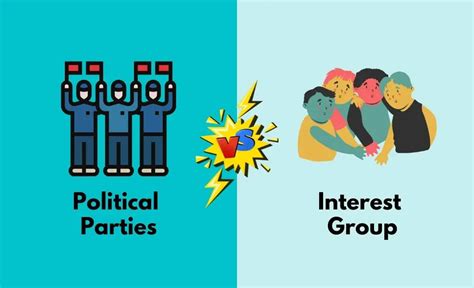Political parties and interest groups are two types of organizations that play a role in the political process. While they have different goals and methods, they share some important similarities.

Organizational Structure
Both political parties and interest groups have a formal organizational structure. They have leaders, members, and staff. They also have rules and procedures that govern their operations.
Goals
The goals of political parties and interest groups are different. Political parties aim to win elections and control government. Interest groups aim to influence government policy on behalf of their members.
Methods
Political parties use a variety of methods to achieve their goals. They run candidates for office, raise money, and organize rallies. Interest groups use a variety of methods to influence government policy. They lobby elected officials, testify before committees, and run public awareness campaigns.
Influence
Both political parties and interest groups have influence in the political process. Political parties have influence because they control the government. Interest groups have influence because they represent the interests of large numbers of people.
Examples
Some examples of political parties include the Democratic Party, the Republican Party, and the Libertarian Party. Some examples of interest groups include the National Rifle Association, the American Civil Liberties Union, and the Sierra Club.
Conclusion
Political parties and interest groups are two types of organizations that play a role in the political process. While they have different goals and methods, they share some important similarities. Both have a formal organizational structure, goals, methods, and influence.
Benefits of Political Parties and Interest Groups
Political parties and interest groups can provide a number of benefits to society.
-
Political parties:
- Provide a way for citizens to participate in the political process
- Help to organize and represent public opinion
- Recruit and train candidates for office
- Provide a platform for political debate
-
Interest groups:
- Represent the interests of specific groups of people
- Provide a way for citizens to influence government policy
- Help to educate the public about important issues
- Monitor government activity
Effective Strategies for Political Parties and Interest Groups
Political parties and interest groups can use a variety of effective strategies to achieve their goals.
-
Political parties:
- Develop a clear and concise platform
- Recruit and train strong candidates
- Raise sufficient funds
- Organize effective campaigns
-
Interest groups:
- Identify and articulate the interests of their members
- Build relationships with elected officials
- Use a variety of lobbying techniques
- Educate the public about important issues
Why Political Parties and Interest Groups Matter
Political parties and interest groups matter because they play a vital role in the political process. They provide a way for citizens to participate in the political process, influence government policy, and hold elected officials accountable.
FAQs
-
What is the difference between a political party and an interest group?
- Political parties aim to win elections and control government. Interest groups aim to influence government policy on behalf of their members.
-
What are the benefits of political parties and interest groups?
- Political parties provide a way for citizens to participate in the political process, organize and represent public opinion, recruit and train candidates for office, and provide a platform for political debate. Interest groups represent the interests of specific groups of people, provide a way for citizens to influence government policy, help to educate the public about important issues, and monitor government activity.
-
What are some effective strategies for political parties and interest groups?
- Political parties can develop a clear and concise platform, recruit and train strong candidates, raise sufficient funds, and organize effective campaigns. Interest groups can identify and articulate the interests of their members, build relationships with elected officials, use a variety of lobbying techniques, and educate the public about important issues.
-
Why do political parties and interest groups matter?
- Political parties and interest groups matter because they play a vital role in the political process. They provide a way for citizens to participate in the political process, influence government policy, and hold elected officials accountable.
Conclusion
Political parties and interest groups are two important players in the political process. They provide a way for citizens to participate in the political process, influence government policy, and hold elected officials accountable.
